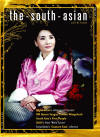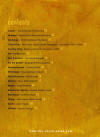|
|
the-south-asian.com August 2007 |
|
|||
|
Famous
Bazaars
Ratan Tata Remaining articles
Books Between
Heaven and Hell
|
|
||||
|
Page
2 of 2
Her
Majesty Ashi Sangay Choden Wangchuck (cntd.)  "You have to reach out to people. They cannot come to you." Having spread awareness on reproductive health and family planning, the next step was to address the issue of HIV AIDS, with emphasis on protection. A hundred cases of HIV were reported – a small number by many standards – but enough to realise that HIV/AIDS was now a major public health concern. The HIV AIDS message was not confined only to villages and hamlets – institutions such as the Armed Forces were also targeted. What began as a drive to tackle issues of reproductive health, revealed there were other, as yet unaddressed issues – teenage pregnancies in remote areas, the moving stories of sex workers in the southern part of the country, alcohol abuse and consequent social exclusion, marginalization of some members of society, and substance abuse. A whole range of new concerns now emerged and lay in the open. The challenge before Her Majesty was how to go about providing back-up services – and thus arose RENEW – an organization launched in 2004 – an acronym for Respect, Education, Nurture, Empowerment of Women. Supported in part by UNFPA, RENEW had on its agenda the reintegration of disadvantaged women and adolescents as socially responsible and economically productive members into mainstream society. A year after the establishment of RENEW, the Government of India committed to build a crisis management centre and a rehabilitation centre as a back-up service for the newly established RENEW. With a rapidly increasing population, porous borders to the south, east and west, together with a mobile population, it became imperative to seek preventive measures to thwart the spread of HIV AIDS and other sexually transmitted diseases. The obvious choice for Her Majesty was to focus on women. In Bhutan, as in other South Asian societies, a "woman is the pillar of strength in the household and the strength of the family." Women were therefore imparted information on nutrition, cleanliness and health, and the efforts soon bore results. "The biggest impact has been on hygiene. Children are healthier and cleaner. Families are eating right with improved nutrition", adds Queen Sangay Choden Wangchuck. Mass awareness and education are a growing reality in Bhutan. "Bhutan is changing so rapidly, and I want RENEW to contribute something tangible to improve the lives of disadvantaged groups, particularly of disadvantaged women," says the Queen. Indeed Bhutan is marching on rapidly; in December 2006, the fourth King abdicated in favour of the Crown Prince who is now the fifth King. And in 2008, Bhutan will hold its first democratic elections when the country will become a constitutional monarchy. The Queen has emphasized that individual nurturing is just as important to reintegrate the marginalized into mainstream society. A juvenile delinquent was asked what she wanted to do once she was out of the Juvenile Cell and free. "I want to be a police woman," she said. Her wishes were respected and supported. On release from the juvenile cell she was enrolled in the police academy and she is on her way to becoming a policewoman – a custodian of law and order. Sensitivity is high on the Queen’s agenda. Monarchy’s work and involvement within the society at the micro level has brought vitality, buoyancy, hope and most importantly tangible results in areas of social and economic development. Queen Sangay Choden Wangchuck credits the success of her efforts to team work. No individual is insignificant and no problem too small. Her Majesty is looking for 100% success.
*****
|
|||||
|
Copyright © 2000 - 2007 [the-south-asian.com]. Intellectual Property. All rights reserved. |
|||||

